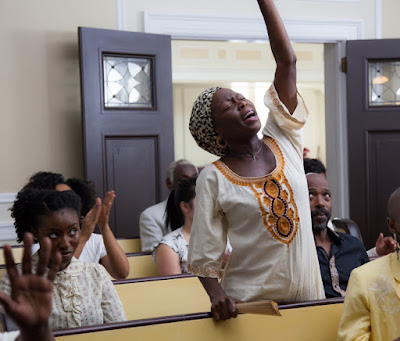The immigrant experience has been explored before in film, but Farewell Amor (2019) takes the cinematic depiction of immigration to new artistic heights. Farewell Amor is the feature debut of the Tanzanian-American filmmaker Ekwa Msangi, and it is an astonishingly assured film that recalls the domestic dramas of such cinematic giants as Yasuiro Ozu and Hirokazu Koreeda. Like those filmmakers, Msangi knows how to subtly explore the deep fissures that exist within all families, and how to portray these conflicts in an emotionally powerful way.
Farewell Amor is the story of a father, mother, and daughter whose lives are torn apart by the Angolan Civil War. They reunite 17 years later in Brooklyn, New York, where Walter (Ntare Guma Mbaho Mwine), the father, has been living, while Esther (Zainab Jah), the mother, and Sylvia (Jayme Lawson), the daughter, stayed behind in Angola. After Walter moved to New York, he started a relationship with Linda (Nana Mensah), which he has to end when his wife and daughter move in with him after their 17 year separation. This affair forms the basis of the domestic problems which Walter tries to resolve with the wife and daughter, as they try to rebuild their shattered lives.
The structure of Farewell Amor is ingenuously divided into three separate sections, with each segment focusing on the three main members of the family. By dividing the film into these three narrative arcs, Msangi is able to convey different aspects of her three main characters which aren't readily apparent in the preceding storylines. While the daughter Sylvia seems like a quiet and introspective character in the father Walter's section, she is revealed to be an outgoing and vibrant woman in the part of the film which focuses on her daily life. Also, in her own section of the film, we see why the mother Esther is so fervently obsessed by religious fervor, a trait which seems off-putting at times in the father Walter's storyline.
By separating Farewell Amor into these three narrative divisions, Msangi reveals the multiple dimensions of each of her main protagonist's story arcs, and is able to at times film the same scenes but from other perspectives. This allows Msangi to portray the multi-facted nature of the immigrant experience, and explore how it can affect the lives of each generation of a single family, from the youngest member, to the eldest. Msangi also delves into the family's history in Angola, as she slowly reveals the true tragic circumstances leading up to their reunion in New York.
The mother Esther's story explores the struggles many immigrant wives experience, as they must both learn to adapt to their new environments, while paying respect to the traditions and values of their original homelands. The father Walter's story examines the loneliness and the difficulties of assimilating to a new culture that so many immigrants experience when they move to America by themselves. The daughter Esther's narrative reveals the prejudice and discrimination immigrant youths face when they have to learn how to adapt to a new country. All three of the actors in Farewell Amor give authentic and naturalistic performances that make us feel like we are watching a documentary at times.
As Msangi slowly and powerfully unveils the complex and intricate narrative of Farewell Amor, she proves to be a master of the cinematic form. The three story arcs of her main characters intersect and and at times collide with each other at different points throughout the film, culminating in an extremely moving conclusion that gives the viewer a sort of halting, yet ultimately optimistic, vision of the future of immigrants living in America. By giving each protagonist the space to reveal their own points of view, Msangi provides a multi-layered portrait of immigrants as real people trying their best to rebuild their lives in the United States.




